calsfoundation@cals.org
William and Henry Beavers (Lynchings of)
In 1890 and 1892, brothers William and Henry Beavers—both African American—were lynched near Warren (Bradley County) and Wilmar (Drew County), respectively. William was accused of assaulting Inez Abernathy, whose family he had been living with. Henry was murdered for attacking Chloe Wright, the daughter of a prominent Drew County farmer.
In 1880, William Beavers (then two years old) and his brother Junior (presumably Henry, age four) were living in Pennington Township of Bradley County with their parents, Henry and Lorenda Beavers, and several other siblings. Henry Beavers Sr. was thirty years old and was a farmer. If these ages are correct, William Beavers would have been only fourteen years old at the time of his murder, and Henry sixteen. Both brothers were described by the Arkansas Gazette as “brutes.”
According to the Gazette, by 1890, William Beavers—supposedly twenty years of age—was living near Warren with J. H. Abernathy, a Confederate veteran and prominent farmer. On the morning of August 8, Beavers encountered Abernathy’s daughter, Inez, while she was gathering eggs. He assaulted her, and as he attempted to “outrage” her, she screamed and alerted her mother. Beavers fled and later attempted to assault a young African-American girl near “Mr. Sutton’s plantation.” This is probably David W. Sutton, a prominent Bradley County farmer.
Area residents learned of the assault on Inez Abernathy that night and formed a posse. Beavers was captured a few miles from Warren on August 10. When Sheriff William Rufus Watson and four assistants attempted to take him to a cell, a group of men seized the sheriff from behind and took away his keys. According to the Gazette, “Sheriff Watson and two of his deputies were then forcibly carried up stairs and locked in the jail, and two more were taken under guard and carried to the foundry.” Although the sheriff and his deputies shouted out from the jail, no one heard them for several hours. The Gazette stated, “No blame is attached to the Sheriff, as he was overpowered, and unable even to give an alarm….He says the party, as far as he could tell, were all masked, and recognition was impossible.”
Beavers was hanged from a nearby tree. The Gazette goes on to call Beavers a “troublesome fellow,” who “had been for a year or two a terror to the women and children. He was under bond for an assault on a colored girl, and would probably have gone to the Penitentiary for that offence, had he not been so summarily disposed of for his last act.”
In February 1892, William’s brother Henry was accused of assaulting Chloe Wright near Wilmar. According to the Byrne family tree, Chloe Wright was the daughter of Drew County farmer Andrew Jackson Wright and his wife, Eliza. Chloe was about seventeen at the time of the alleged assault.
The Gazette reported on February 9 that the assault on Chloe Wright occurred between Wilmar and Alice Station (Drew County) at 9:00 a.m. on February 8. Although this initial report identifies Beavers as “Jim Beavers,” and refers to him as the brother of “Jeff Beavers” who had been lynched the previous year, census records do not seem to reflect these names. Research indicates that the two Beavers brothers who were hanged were indeed Henry and his brother William.
The New York Sun reported on Henry Beavers’s murder on February 9. Chloe was described as “attractive and popular,” and her father as “a farmer and an influential citizen.” According to the Sun’s report, Chloe was halfway between her house and the nearest neighbor’s when she was “met in the public road by Beavers, who made improper proposals. Then he seized and threw her to the ground, holding her by the throat and choking her almost into unconsciousness.” Chloe fought back and told Beavers that her mother was coming, and he fled. Chloe was apparently badly injured, but she was expected to recover.
News of the attack quickly spread. The Sun stated, “In less than half an hour horsemen armed with pistols and clubs were scouring the woods in every direction.” Around 1:00 p.m., they discovered Beavers walking with his mother along the railroad track toward Wilmar. When approached, he did not resist and was taken into town, where he was quickly surrounded by a mob of 150 people. They took him to the Wright home, where Chloe recognized him and where he supposedly confessed. The crowd then took Beavers back into town, “where they paraded the principal thoroughfares.” They then forced him to carry a rope to a tree in the woods. There the rope was thrown over a limb, and Beavers was put on a horse with the noose around his neck. When the horse began to move, “Beavers was left dangling in the air. Before the body ceased to vibrate a volley of shots rang out and it was perforated with no fewer than sixty bullets.”
The Sun reported that Beavers was only seventeen and was the brother of Will Beavers, “who was hanged to a tree in the court yard at this place one year ago for an attempted assault upon a young white girl.” According to the Gazette, the grand jury, “composed of our best citizens,” refused even to consider the coroner’s report on Henry Beavers’s death, refusing “to investigate or even read the within.”
Chloe Wright did recover from the reported attack. On April 10, 1894, she married Thomas Gregory Byrne. By 1900, they were living in Wilmar with their three children; Chloe Byrne died in 1912 at the age of thirty-seven.
For additional information:
“A Black Brute.” Arkansas Gazette, February 9, 1892, p. 1.
“A Black Brute Lynched.” Arkansas Gazette, August 12, 1890, p. 1
“Fate of a Fiend.” Arkansas Gazette, February 13, 1892, p. 1–2.
“The Lynching of Beavers.” Arkansas Gazette, August 13, 1890, p. 3.
“Swift Arkansas Justice.” The Sun (New York), February 9, 1892, p. 1.
Nancy Snell Griffith
Clinton, South Carolina
 Civil Rights and Social Change
Civil Rights and Social Change Post-Reconstruction through the Gilded Age, 1875 through 1900
Post-Reconstruction through the Gilded Age, 1875 through 1900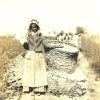 Sharecropping and Tenant Farming
Sharecropping and Tenant Farming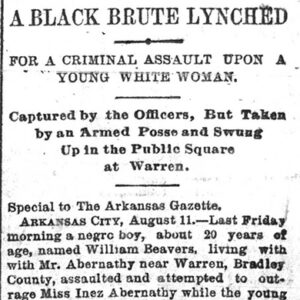 Beavers Lynching Article
Beavers Lynching Article 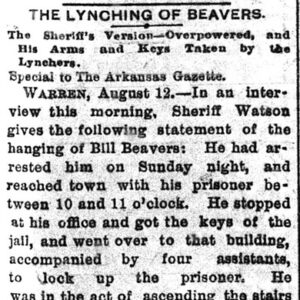 Beavers Lynching Article
Beavers Lynching Article 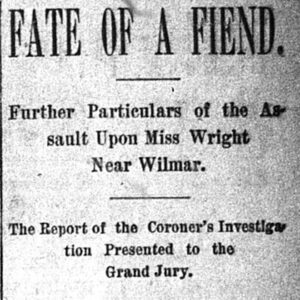 Beavers Lynching Article
Beavers Lynching Article 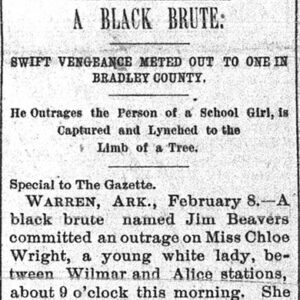 Beavers Lynching Article
Beavers Lynching Article  Bradley County Lynching
Bradley County Lynching 




Comments
No comments on this entry yet.